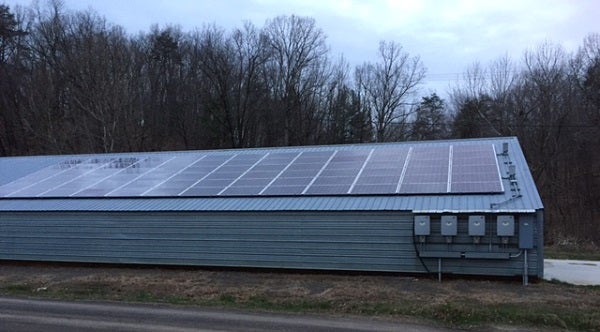Farmer brings solar to West Virginia’s ‘Poultry Capital’

Moorefield, located in Hardy County along the South Branch of the Potomac River, is known as the Poultry Capital of West Virginia. Local poultry farmer Ward Malcolm specializes in contract pullet production in two 50- by 400-foot chicken houses. In 2012 he had solar installed at his farm to save money on his energy bills.
“As a business person, I just looked at the dollars and cents,” Malcolm said. “If it doesn’t make financial sense, I’m not gonna do it.” Malcolm consulted his accountant before deciding to go solar, and together they concluded it was a wise financial investment.
Malcom’s interest in solar was sparked by his work as Dean of Career, Technical and Workforce Education at Eastern West Virginia Community & Technical College. During his tenure at Eastern, Malcolm developed a Wind Energy Technician Training Program to teach students how to service and repair the area’s many wind turbines.
With a professional background in electrical engineering as well as farming and technical education, Malcolm came to realize that renewable energy could meet his farm’s electricity needs. So he decided to have solar panels installed on his chicken houses.
Malcolm hired Berkeley Springs, WV-based Mountain View Solar to design and install a 35-kilowatt, 156-panel grid-tied solar PV system mounted on the roofs of his two chicken houses. One roof faces east; the other faces west. Together, the solar panels offset close to 100% of his farm’s annual electric usage.
Malcolm had heard that the USDA Rural Energy for America Program (REAP) provides grant and loan funding to farms and businesses for renewable energy systems and energy upgrades. But the REAP application process seemed complicated and time-consuming. So Malcolm contacted Hannah Vargason of the Natural Capital Investment Fund (NCIF) to help him apply for a REAP grant.
NCIF is a nonprofit lender that provides loan financing as well as technical assistance, including grant-writing, for energy efficiency and renewable energy projects. Vargason helped Malcolm secure a USDA REAP grant that offset 25% of the total cost of his solar installation. NCIF financed the remaining cost through a solar-specific loan product.
Malcolm says the total project cost was about $120,000, the entirety of which can be depreciated on an accelerated business tax schedule. After the 25% REAP grant and 30% Energy Investment Tax Credit (EITC), the net cost of Malcolm’s solar project was less than $60,000.
Prior to installing solar, Malcom paid about $3,600 for electricity each year. Even if electric rates never increase, he estimates that his investment in solar will pay off within 15 years. And in fact, Malcolm notes, electric rates have already increased since he went solar in 2012. But now his electric bills will always remain close to zero, regardless of future electric rate hikes.
Malcolm says his solar has generated interest from other area farmers. “Seeing solar panels gets people excited about it,” Malcolm said. “They say, ‘Hey, that’s pretty cool. This must be working.’”
Malcolm urges those who are interested in solar to consult their accountant or financial advisor. “If you have a financial person you trust, it’s well worth going to them and saying, ‘Here’s the numbers. Give me some feedback. What’s the payback?’
Eastern West Virginia Community & Technical College is helping to educate area farmers about renewable energy and other technologies that can make farming more efficient and cost-effective. Malcolm recently spoke about his experience going solar at a Renewable Energy Workshop hosted by Eastern’s New Biz Launchpad. Representatives from USDA REAP, NCIF, Energy Efficient West Virginia, Mountain View Solar, and WV SUN also gave presentations at the event.
WV SUN has launched an Ag Producers’ Solar Co-op to help West Virginia farmers go solar. WV SUN Solar Co-op Coordinator Autumn Long works directly with participating farmers to connect them with funding resources and solicit proposals from qualified local solar installers. You can find out more and sign up online.
